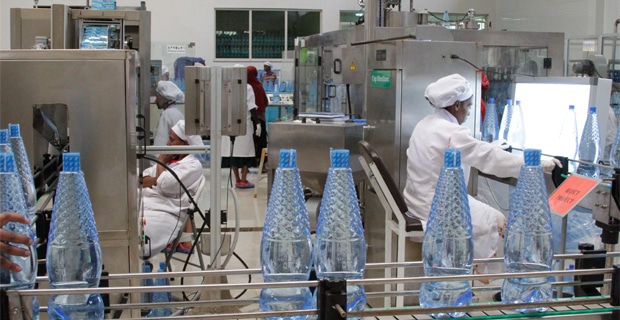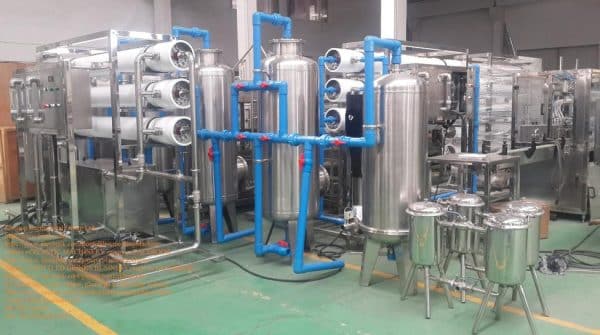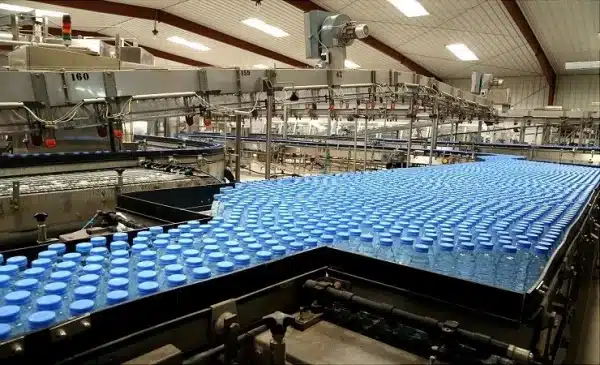If you are considering opening a pure water business in Nigeria, it is important to have knowledge of the equipment needed to start the factory.
This article aims to assist you by providing information on the essential equipment needed to establish a successful sachet and table water factory anywhere in the country.
The pure water industry has gained significant prominence due to the ever-increasing demand for clean drinking water, making it a promising business opportunity.
In this article, we will explore the key machinery and tools required for starting and running a thriving pure water business in Nigeria.
Whether you are a new entrepreneur or looking to expand your existing business, this guide will provide valuable insights into the equipment needed for a successful venture in the pure water industry.
An Overview of Pure Water Business in Nigeria
Water is an important natural resource by which living organisms survive. It is called the “elixir of life” because of its indispensable role in numerous socio-economic and ecological processes.
For humans, water is vital for survival and healthy living. Since the human body is made of above 60% water, and facilitates various bodily functions, which include; regulation of temperature, digestion of food, circulation and transportation of nutrients.
Hence, accessibility to potable drinking water is paramount for good health, averting diseases, and promoting healthy hygiene. Little wonder why pure water is the desired amass in Nigeria.
The pure water factory attempts to make water “mobile” by ensuring potable water is available in portable bags- sachets at strategic positions such as superstores, malls, kiosks, markets and even on the streets so that anywhere, place and time thirst can be quenched.
Equipment Needed for Pure Water Business (Cost)
Establishing a successful pure water business (factory) in Nigeria requires careful consideration of the necessary equipment.
The following equipment is essential for setting up and operating a pure water business:
1. Water Treatment System
This is the heart of the operation as it ensures the purification of water to meet the required standards.
The cost of a water treatment system can range from ₦1,500,000 to ₦9,000,000 depending on the capacity and level of automation.
2. Water Storage Tanks
Adequate water storage is crucial for uninterrupted production. The size and number of tanks needed depend on the production capacity.
The cost of water storage tanks can range from ₦500,000 to ₦5,000,000
3. Sachet Water Packaging Machine
This machine is used to package water into individual sachets. It should be capable of sealing the sachets properly and efficiently.
The cost of a sachet water packaging machine ranges from ₦2,000,000 to ₦3,500,000 depending on its capacity and features.
4. Sachet Water Printing Machine
This machine is used to print labels on the water sachets. It is essential for branding and regulatory compliance. The cost of a sachet water printing machine ranges from ₦5,000,000 to ₦3,000,000 depending on its capabilities.
5. Sachet Water Sealing Machine
This machine seals the filled sachets before they are packaged. It should be reliable and capable of producing airtight seals.
The cost of a sachet water sealing machine ranges from ₦500,000 to ₦2.000,000.
6. Water Purification Chemicals
These chemicals are required for water treatment and maintenance. The cost of water purification chemicals can vary depending on the quantity used, but it typically amounts to hundreds of thousands of Naira per month.
7. Power Generator
Given the frequent power outages in Nigeria, a reliable power generator is necessary to ensure uninterrupted production.
The cost of a power generator suitable for a pure water factory can range from ₦700,000 to ₦3,500,000 depending on its capacity.
8. Water Analysis Equipment
Regular water analysis is important to ensure the quality and safety of the produced water.
The cost of water analysis equipment can range from ₦500,000 to ₦2,500,000 depending on the level of sophistication and accuracy required.
9. Water Storage and Distribution Containers
These containers are used to store and distribute packaged water. They should be durable and hygienic.
The cost of water storage and distribution containers ranges from ₦200,000 to ₦1,000,000 depending on the size and material.
10. Water Dispensing Racks
These racks are used to display and dispense packaged water in retail outlets. The cost of water dispensing racks ranges from ₦200,000 to ₦1,000,000 depending on the size and design.
11. Laboratory Equipment
Setting up a laboratory for quality control and testing is essential for a large-scale company. The cost of laboratory equipment can run into millions, depending on the scope and complexity of the testing required.
In addition to the equipment costs, other expenses include licensing and permits, operational and maintenance expenses, salaries, marketing, and other miscellaneous expenses for the day-to-day running of the factory.
It is important to carefully consider and plan for these costs to ensure the smooth operation and profitability of the pure water business in Nigeria.
- Read Also: Popcorn Production Checklist
NAFDAC Requirement for Pure Water Production
The National Agency for Food and Drug Administration and Control (NAFDAC) is responsible for regulating and controlling the manufacture, importation, distribution, sale, and use of food, sachet water etc in Nigeria.
NAFDAC has some requirements such as;
1. The company must be regulated by the Corporate Affairs Commission (CAC) as a limited liability company or enterprise.
2. The approval for business locations must be obtained from the appropriate government agency.
3. The source of water must meet NAFDAC’s standards.
4. Ensure that the design and construction of your factory are in tandem with Good Manufacturing Practice (GMP) guidelines, such as; drainage canals, ventilation, proper lighting, sanitation facilities and a good layout
5. Install an appropriate water treatment system to purify the water and ensure it meets the standards set by NAFDAC.
6. Register your brand with NAFDAC by submitting the necessary documents, including the application form, product information, labelling details, and samples for testing.
7. Proper record keeping: This includes regular water testing, hygiene practices, and record-keeping.
8. Ensure following NAFDAC’s regulations for; approved materials and printing on the sachets, such as product name, manufacturer’s details, NAFDAC registration number, batch number, and expiry date.
9. Ensure Compliance with the relevant Nigerian Industrial Standards (NIS) for sachet water production, such as NIS 310:2009 for packaged water.
10. Provision should be made for staff training- proper hygiene practices, and appropriate protective gear, such as gloves and hairnets, to maintain cleanliness and prevent contamination.
- Read Also: Requirements for Engine Oil Business
How Profitable is the Business??
According to Statista, The revenue in the Bottled Water segment amounts to US$4.95bn in 2023. The market is expected to grow annually by 11.14% (CAGR 2023-2027).
The sachet water business, commonly known as “pure water” in Nigeria has been lucrative over the years.
However, some factors determine this profitability index. They include; efficiency of operations, market conditions, and competition.
Why the business has a high profitability index in Nigeria
1. Nigeria’s high population implies high demand
2. Cost of production, packaged materials and plastics is inexpensive
3. Distribution covers wide networks which means massive turnover
4. Pricing yields a good profit margin.
5. The sachet water industry in Nigeria is highly competitive, with numerous brands vying for market share. Branding, quality, and customer loyalty play crucial roles in establishing a profitable position in the market.
Risks in the Pure Water Business in Nigeria
Amidst the high profitability index and lucrativeness of the business, just like any other, the business has certain risk factors. They include but are not limited to;
1. Water Source Contamination: It is important to test the water source periodically against contamination.
2. Price Sensitivity: strike a balance between profitability and affordability because most consumers can switch brands when the product price goes high.
3. Infrastructure challenges: Power outages or transportation difficulties can hamper production as well as distribution processes resulting in delays, increased costs of production, and customer dissatisfaction.
4. Regulatory Compliance: The sachet water business is subject to various regulations, including licensing, water quality standards, and packaging requirements.
Failure to comply with these regulations can result in penalties, closure of operations, or damage to the brand
5. Security and Theft: Pilferage and theft can be a problem, especially during transportation and storage. It is important to follow safety measures to protect your product and minimize losses.
- Read Also: Risk in Catfish Business
Conclusion: Equipment Needed for Pure Water Business
I believe you have learned a lot from this article on the equipment needed for starting a pure water factory in Nigeria. We highlighted these pieces of equipment and most importantly their associated costs.
All of this information will help you make an informed decision on what is needed to start a profitable pure water production business in the country. I wish you good luck on this project!

Legacy Benjamin is a serial SEO content writer with a half-decade of experience in the field of blogging. He is also a skilled business consultant, providing valuable insights to companies and individuals seeking growth and success. His expertise lies in crafting compelling and engaging content that captivates audiences and drives business results. For business deals, contact him




Having a pure water business in Nigeria is crucial due to the pressing need for safe and clean drinking water. Nigeria faces significant challenges in accessing potable water, with many relying on unclean sources that pose health risks. By operating a pure water business, you can contribute to improving public health by providing affordable, purified water to communities. This business not only addresses a fundamental need but also creates employment opportunities and promotes sustainable development. With proper filtration and adherence to quality standards, a pure water business in Nigeria can make a meaningful impact in ensuring access to safe drinking water for all.